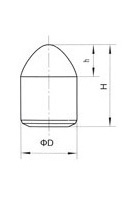Cavities are part of life — nine out of ten adults will have one at some point in their life and a quarter of all adults have an untreated cavity.
Getting cavities treated can be scary — but knowing more about the process can help. Sami Shahhal, a restorative dentist and owner of a dental-educational channel called Smile Influencers, walked Insider through the process. Mushroom Bits

This is a tooth with a filling. It's seen through a mirror. In the background is a purple surgical field used by dentists to isolate the area they're working on.
You can see the tooth has a large filling, a slightly whiter spot going across the top of the tooth.
The filling has chipped. Below it, a cavity has developed. This is the brownish-brown spot between the two adjacent teeth.
To get to the cavity, Shahhal first needs to remove the damaged filling.
He does this by using a diamond burr — the shrill drill that makes the dreaded sound — to scrape back any of the filling material.
To treat the cavity, Shahhal digs into the tooth, getting rid of any tissue that's been infected using a round-tipped drill.
Cavities are caused by bacteria on your teeth, gone wild.
The bacteria are always there, and mostly not a problem. When they get hold of food like sugars and starches, they make an acid. That acid dissolves the enamel on the teeth little by little.
That happens every time you eat. But if the attacks are repeated, for instance, if you eat sweets and chips several times in a day, that can become too much for the tooth and create a hole.
The bacteria grow deeper and deeper into the tooth. The infection can get very painful, and be dangerous if untreated.
The only way to treat it is to drill into the tooth to get rid of the infected material.
After stripping off the infected tissue, what's left is clean tissue from inside the tooth, called dentin.
But it can't be left exposed like this without any enamel to protect it.
If the dentin is exposed, the teeth will become more sensitive to hot and cold and be more vulnerable to infection.
To help prevent any further damage, Shahhal needs to fix the tooth with resin.
Fixing a tooth is a little like doing construction work: you first need to do some prep to make sure your material will stick to your surface.
The first step is to cover the surface in etchant — that's the blue liquid above.
An etchant is a mild acid that dissolves the surface of the tooth slightly. This makes the surface a little more porous to help it attach to resin, the material used to fix the tooth.
Shahhal then applies a bonding agent to the tooth using a small brush.
Bonding agents are made of hard resin that seeps into the pores created by the etchant. As the resin hardens, it creates a base from which the filling can be built.
Resin doesn't like sticking to the surface of the tooth, that's why you have to treat it with etchant before you bond it. But resin loves sticking to resin, so having this base layer is crucial for the filling to stick.
Now that the bonding agent has hardened, Shahhal can start repairing the tooth.
Dental resins contain materials that make them go harder if they are exposed to certain types of light.
That's why your dentist will often reach for a blue light when repairing your teeth. When applied to the resin, it triggers it to harden. Dentists apply the resin layer after layer, hardening it at each stage to rebuild the tooth.
The last step is smoothing the filling out.
The tongue is incredibly sensitive. Studies have shown that in some cases, the tongue can feel tiny bumps better than a fingertip could.
So it's important for the filling to feel smooth, and also to keep food from getting stuck in the crevices.
This tooth has a crown. In the middle is an access hole, used to help dentists get to the bottom of the tooth if they need to. Next to it are teeth that have silver fillings in them.
There's a large cavity developing under the crown, so it has to be removed to fix the tooth.
The dentist starts drilling into the crown. Crowns are coverings often made of porcelain, resins, or ceramics that are placed over a heavily damaged tooth to protect it.
The crown is bonded to what's left of the tooth underneath, so Shahhal uses a lever to lift the crown away.
From here, Shahhal will repair the tooth using the same principle as described before.
Crowns are put over teeth that pretty much all gone, so what you see here is what's left of the tooth under the crown.
A burr is used to dig out the infected material.
Here the tooth was badly damaged and there's so little of it left that he drills right to the center.
Now the tooth is clean, Shahhal can proceed with the filling.
This is pretty much the same process as before. He starts by putting etchant, then adding bonding agent, then building up resin little by little.
Because this tooth will go under a crown, he builds up the resin into a mound shape, which is perfect to stick a crown onto.
The new crown won't be immediately ready though, and the tooth can't be left uncovered for that long.
So Shahhal creates a temporary crown, by pouring acrylic onto a molding of the tooth.
This is what the tooth looks like with the temporary crown fitted in.
To limit the risk of developing cavities, here are some tips.
Fluoride helps. Drink fluoridated water, use a fluoride toothpaste or mouthwash, these all help prevent cavities from developing.
Brush your teeth twice a day. Make sure not to brush your teeth too vigorously to avoid damaging your gums and the enamel on your teeth.
Floss. Food trapped between teeth can be a veritable smorgasbord for cavity-causing bacteria.

Rock Teeth For Auger Bit Quit smoking. Smoking and using other tobacco products is very bad for your teeth, and for your overall health.